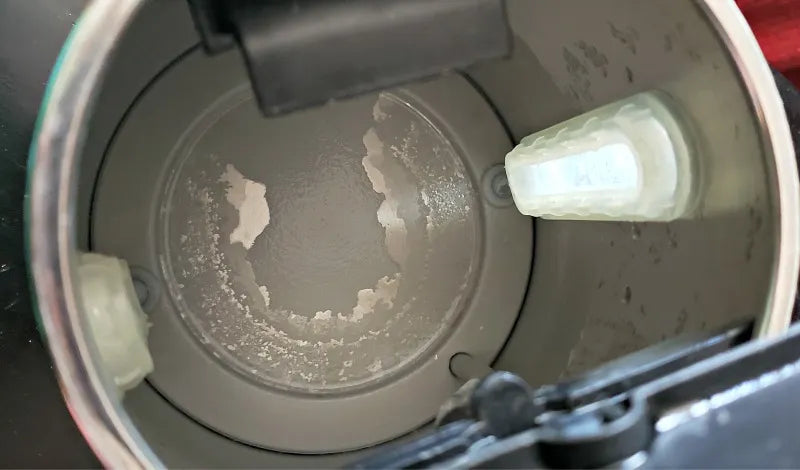Adjust Your Water for Better Grows
In this blog, we'll tell you how to push plant growth as far as possible by tailoring your nutrients to the water in your local area.
All tap water is not created equal - waters from different areas come with varying levels of dissolved mineral content. You'll hear this referred to as 'water hardness'. The greater the level of minerals present, the 'harder' the water. Ever noticed a build-up of scaly white crusts on the inside of your kettle? Then you've got hard water.
Water hardness will have an impact on the nutrients that are required for optimal growth. That's because the dissolved mineral content can act as a usable feed for plants. The minerals typically found in tap-water are calcium, magnesium and carbonates. If you have 'soft water' (low mineral content), you'll need to feed your plants with extra calcium and magnesium. In the opposite fashion, fertilisers tailored to hard water contain less of these secondary macro-nutrients. No matter what your local water-type is, we've got the products you need to optimise growth rates and maximise yields. Read on to find out how to check your own water hardness and do something about it.
How Hard is My Water?
The easiest way to find out your water hardness is to come and visit one of our stores so that we can test it for you! Just make sure that you bring at least 100ml, and keep it in a clean, sealed container.
The second easiest way is using the ever-popular Bluelab Truncheon. It's one of the best-known pieces of testing equipment in the industry; professional growers love it because it's accurate enough to give you extremely useful information, while being rugged and dependable enough to cope with the demands of indoor gardening. In fact, Bluelab are so confident in the build quality that they offer a five-year manufacturer's warranty, so you can buy one with complete peace of mind.
Using the truncheon is incredibly easy. It arrives pre-calibrated, so all you really need to do is dip the tip of it in your water. The blue LEDs on the side provide you with your electrical conductivity reading or 'EC' (the units used to measure mineral content).
- If your tap water has an EC of 0.3 or below then you have soft water.
- An EC level between 0.4 and 0.7 indicates that you have normal to moderately hard water.
- EC levels is or higher than 0.8 indicate that you have very hard water.
Soft Water (0 - 0.3)
You have two options here. The simplest route is to opt for a base nutrient that's tailored to your water type, as many nutrient manufacturers offer specific soft and hard water variations. Notable examples are Canna, Dutch Pro, General Hydroponics, Mills, Plant Magic, Shogun and Vitalink.
If your base nutrient is non-specific (neither hard nor soft) then don't worry, because there's an easy solution. Just add in a cal-mag supplement to boost calcium and magnesium levels. Canna Calmag Agent is perfect for the job, though there are plenty of other options available, from brands including Vitalink Calmag. Exact directions will vary depending on the particular product. Consult the label for more info.
Moderately Hard Water (0.4 to 0.7)
The good news here is that you won't need to do much at all. Just use any non-specified or hard-water base nutrient (basically anything that isn't soft-water). If you start to see signs of calcium or magnesium deficiencies, you can still add in a low dose of cal-mag. Some dissolved minerals are more available to plants than others, so play it by ear.
Hard Water (0.8+)
If you're getting readings above 0.8 then there's almost certainly too much calcium and magnesium in the water. The risk here is that you could end up locking out other nutrients.
It's not a problem, though, because we've got the perfect solution. Reverse osmosis units get your tap-water close to zero, almost completely removing mineral content, allowing you to start with a blank canvas.
The Growmax Power Grow 500 tackles 500 litres of water per day - more than enough for most growers. It'll last for six months before the cartridge needs replacing and, as well as tackling dissolved minerals, it will also remove heavy metals, chloramines, nitrates, nitrites, chlorine, sediment, dirt, rust, oxidation, herbicides, pesticides, volatile organic contaminants, benzenes, toluene, oils, THMs, detergents, and PCBs!
As RO units can take your water from very hard to very soft, you should use a quality cal-mag additive to bring it back to about 0.4 - 0.5 and then use a nutrient for hard water. Alternatively, you could use a nutrient which is designed for RO water, such as Advanced Nutrients.
Maintaining Optimal pH and EC Levels
You'll need to monitor pH and EC levels regardless of whether you're in soft or hard water. Our water conditioning kits give you everything you need to keep your pH and EC in optimal ranges at all times. Not only that, they come with Ecothrive's excellent product Neutralise, which tackles chlorine and chloramine, nullifying their effects. This helps to create a better environment for beneficial microorganisms, making products like Biosys work much more effectively.
What Else Does Hardness Affect?
RO units aren't just useful for making up nutrients; there's another very important reason to pay attention to water hardness. If you're running a humidifier to increase atmospheric moisture levels, the dissolved mineral content in water can cause all sorts of damage.
This is an exceptional case that is immediately obvious. But don't forget that every single percentage decrease in reflector efficiency - even if it appears unnoticeable - is costing you money in potential yields. A small investment in a Growmax RO will easily pay for itself further down the line!

